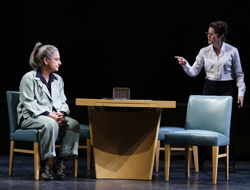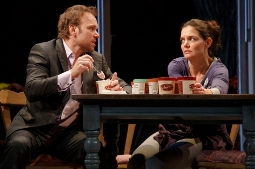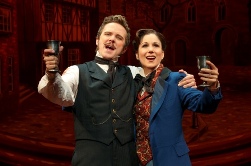Review: The Anarchist
Dec 3rd

A situation rife with dramatic possibilities is given a frustratingly airless treatment in David Mamet’s new drama about a prisoner arguing for her parole before an impassive prison official. Wasting the talents of Patti LuPone and Debra Winger, the latter marking her Broadway debut, The Anarchist is a self-indulgent exercise that, with its barely 70-minute running time and severely limited emotional palette, hardly belongs in a Broadway house (not to mention charging astronomical Main Stem prices).
Set in the dingy confines of the unspecified official’s office—she may or may not be the warden—the play depicts the encounter between Cathy (LuPone), a former violent radical (think the Weather Underground) who was imprisoned decades earlier for the murder of a police officer. Now having an undergone a religious conversion from Judaism to Catholicism, the contrite prisoner proclaims both her innocence and her supposed rehabilitation.
Responding to her pleas in argumentative rhetorical fashion is Ann, whose primary response is to repeatedly offer the possibility of Cathy’s release if she would only give up the whereabouts of her former lover and partner-in-crime.
The give-and-take seems to go endlessly, thanks to the playwright’s stultifying dialogue that displays little of the fiery spark for which he’s renowned. This is Mamet in minimalist mode, more reminiscent of such similarly stifling efforts as The Cryptogram than such early classics as American Buffalo and Glengarry Glen Ross. By the time the brief evening reaches its supposedly shocking conclusion, playgoers will be left scratching their heads.
Mamet, as he’s demonstrated many times in the past, does himself no favors by also directing the piece. There’s no dramatic momentum to the proceedings, and even these normally reliable actresses seem mainly adrift. Both deliver competent, at times even forceful performances, but they have so little to work with that they barely make an impact. Surprisingly, the veteran LuPone is hard to understand at times, often swallowing her lines, while relative theater novice Winger projects with authority.
While it would be silly to look for lavishness in a prison office, Patrizia Von Brandenstein’s set design seems even more wanly drab than it needs to be, and her unflattering costumes—LuPone in a bulky prison uniform, Winger in a mannish pantsuit—make the performers seem heavier than they actually are.
The frequently repetitive dialogue is peppered with philosophical ruminations about politics, religion, crime and punishment, but here they seem more redolent of the playwright’s soapbox than they are organic to the characters and situation. The Anarchist is represents Mamet at his most mannered and inaccessible, and that’s saying something.
Golden Theatre, 252 W. 54th St. 212-239-6200. www.Telecharge.com. Through Feb. 17.
Review: Dead Accounts
Nov 30th

The ever-reliable Norbert Leo Butz should earn a Broadway MVP award for his dynamic comic turn in Dead Accounts, the latest effort by the prolific scribe Theresa Rebeck (Seminar, The Understudy, Mauritius). This comedy set in America’s heartland—specifically, Cincinnati—wastes a sterling cast, including tabloid media darling Katie Holmes, in a half-baked tale that doesn’t even manage to follow through on its thin premise.
Butz plays Jack, who in the play’s beginning is seen making an unannounced visit to his family home inhabited by unmarried sister Lorna (Holmes), mother Barbara (Jayne Houdyshell) and seriously ill, unseen father. Since he’s throwing money around with careless abandon, it soon becomes apparent that his homecoming has been prompted by more than nostalgic reasons, with the reason made clear shortly before the first act curtain. Complicating things even further is the arrival of his soon to be ex-wife Jenny (Judy Greer), whose dislike for his family is reciprocal.
To reveal the secret behind Jack’s return, hinted at in the play’s title, would be to spoil one of its few comic surprises. Suffice it to say that he’s on the lam and that Jenny is less interested in reuniting than in persuading him to share his ill-gotten spoils.
Subplots involving the father’s worsening condition and the reciprocal attraction between Lorna and Jack’s sad sack best friend Phil (Josh Hamilton) go nowhere, with the play’s chief comic mileage derived from Jack’s ebullient personality and penchant for toting home copious amounts of food. But when the play’s biggest laugh stems not from not from a situation or line of dialogue but rather the appearance of a box of wine, you know that something is awry.
Although some may find him over-the-top, Butz brings so much comic energy to his portrayal of the ice-cream obsessed Jack that he single-handedly ratchets up the proceedings. But while Houdyshell brings nice grace notes to her sensitive turn as the worried mom, the rest of the performers don’t fare as well. Holmes, although admirably willing to be de-glamorized as the improbably still single sister, doesn’t possess the stage chops to come across here as much more than bland. Hamilton is underused as the nebbishy friend, and Greer, so effective in her film and television work, mainly seems wan and uncomfortable onstage.
Director Jack O’Brien has staged the proceedings with his usual efficiency although without a shred of inspiration, and a climactic scenery transformation, meant to convey one character’s spiritual epiphany, merely seems extraneous. It’s indicative of all the effort that’s been invested in this show with very little pay-off.
The Music Box, 239 W. 45th St. 212-239-6200. www.Telecharge.com.
Review: The Mystery of Edwin Drood
Nov 14th

A true fondness for the British music hall is probably a prerequisite to fully enjoy the charms of The Mystery of Edwin Drood, Rupert Holmes’ 1985 musical based on an unfinished novel by Charles Dickens that is being given a beautifully staged revival by the Roundabout Theatre Company. But despite its many amusing moments, the proceedings tend to wear thin over the course of two-and-a-half hours, even with the much ballyhooed audience involvement in choosing the final plot twists.
That gimmicky aspect, in which we’re given the chance via raised hands and applause to determine such aspects of the story as the identity of the title character’s murder, the detective-in-disguise and the secret lovers, adds an undeniable element of fun to the experience, even if the process tends to drag on.
The evocative atmosphere is established immediately, with the ushers dressed in period costumes and the performers playfully interacting with the audience before the show. Eventually a master of ceremonies dubbed the Chairman (Jim Norton) introduces the actors who will be playing the characters in Dickens’ gothic mystery tale.
These characters include choirmaster and opium addict John Jasper (Will Chase, fresh from TV’s Smash), who is madly in love with his young pupil, Rosa Bud (Betsy Wolfe); his nephew and perceived romantic rival Edwin Drood (a cross-dressing Stephanie J. Block): the mysterious Ceylonese Neville and Helena Landress (Andy Karl, Jessie Mueller); the perpetually befuddled and marvelously named Reverend Septimus Crisparkle (a very funny Gregg Edelman); the gravedigger Durdles (Robert Creighton) and his buffoonish deputy (Nicholas Barasch): and Princess Puffer, the owner of an opium den (Broadway veteran Chita Rivera).
The convoluted plot, involving young Drood’s sudden and mysterious disappearance, is ultimately beside the point. It merely provides the springboard for a constant series of visual gags, cheap puns and bawdy humor that is well exploited in Scott Ellis’ breezy staging and the fine efforts of the hard-working cast playing both the Dickens characters and the low-rent entertainers impersonating them. Norton, inheriting the role played so magnificently in the original production by the late George Rose, is a consistent hoot as the jocular host; the ageless Rivera kicks up her heels in fine fashion as the wicked Puffer (and even scored a young lover at the performance attended, thanks to the voting audience); and the rest of the ensemble fully gets into the anarchically silly spirit.
Less felicitous is Holmes’ score which--although it impressive as it apes its music hall inspirations--fails to be memorable, save for the pretty ballad “Moonfall” and the rousing showstopper “”Don’t Quit While You’re Ahead.”
Adding greatly to the production’s effectiveness are the playful choreography by Warren Carlyle, the lavish, picture-book style set design by Anna Louizos, and the elaborate period costumes by William Ivey Long abetted by the fun wigs created by Paul Huntley.
Studio 54, 254 W. 54th St. 212-719-1300. www.roundabouttheatre.org. Through Feb. 10, 2013.
Review: Vanya and Sonia and Masha and Spike
Nov 13th

Christopher Durang’s Vanya and Sonia and Masha and Spike manages the neat trick of being both a sometimes uproarious send-up of Chekhov and an affectionately heartwarming modern-day variation on his themes. Featuring a stellar cast of such comedic pros as David Hyde Pierce, Kristine Nielsen and Sigourney Weaver, the overlong play overstays its welcome but provides plenty of hilarious moments along the way.
Set at a farmhouse in present-day Bucks County, Pennsylvania, the play first introduces us to siblings Vanya (Pierce) and Sonia (Nielsen), their names given to them by professor parents enamored of Chekhov. The middle-aged Vanya and spinster Sonia live a comfortable life, thanks to the largesse of their successful actress sister Masha (Weaver), who unexpectedly shows up for a surprise visit.
The occasion is a costume party being held by one of her friends at a nearby house formerly owned by Dorothy Parker. Masha, intending to go dressed as Snow White, is happy to invite her siblings along, provided they complement her costume by dressing as two of the dwarves, specifically Grumpy and Dopey.
The endlessly self-absorbed, vainglorious Masha has arrived with Spike (Billy Magnussen), her much younger boyfriend, in tow. An underemployed actor whose biggest claim to fame was nearly getting a part in HBO’s Entourage 2, the equally vapid if hunky Spike has no compunction about stripping down to his underwear to take a quick dip in a nearby pond. There he encounters the sweet young Nina (Genevieve Angelson), who the insecure Masha immediately perceives as a threat.
Also on hand is Vanya and Sonia’s sassy housecleaner Cassandra (Shalita Grant), who lives up to her Greek mythology name by revealing soothsaying powers, not to mention a sideline in voodoo.
Durang’s gift for sharp comic dialogue and well-calibrated gags is well on display here, with the priceless interactions among the eccentric characters providing a steady stream of laughs. But the play strains in its allusions to Chekhov—Vanya and Sonia find their cushy lifestyle threatened by Masha’s announcement that she plans on selling the house, with a wan cherry orchard nearby—and the humor begins to wear thin, especially with several of the principals registering as little more than caricatures.
There are two wonderful scenes in the second act that are well worth the price of admission. Nielsen is brilliant in an alternately poignant and hilarious phone one-sided phone conversation in which Sonia hesitatingly agrees to a date with a man she’s met at the party. And Pierce delivers a tour-de-force comic turn with Vanya’s hysterical tirade about the lack of values and common decency in today’s society compared to when he was growing up in the 1950s.
Featuring a gloriously lavish set by David Korins and hilariously spot-on costumes by Emily Rebholz—Weaver’s Snow White costume is a hoot, as is Magnussen pastel-colored, skin-tight jeans—the production is expertly staged by Durang veteran Nicholas Martin (Betty’s Summer Vacation). The three lead performers are longtime collaborators of the playwright as well, which no doubt accounts for the relaxed comfort with which they fit into their comic roles.
Mitzi E. Newhouse Theater, 150 W. 65th St. 212-239-6200. www.lct.org.
Review: Annie
Nov 9th

Yes, the sun will come up tomorrow, but it sure doesn’t shine as brightly in the new Broadway revival of Annie. James Lapine’s staging of this clockwork-perfect musical somehow manages seriously reduce its quotient of joyfulness to the extent that audiences new to the show may well wonder what all the fuss is about. The ebullient glories of Charles Strouse and Martin Charnin’s classic score remain intact, but this Depression-set musical here seems to be suffering from depression itself.
With the stage festooned with voluminous amounts of laundry hanging on clotheslines, the show begins with a short film documenting the horrendous conditions of the period in which it’s set, establishing a grim mood that seems incongruous for its cartoon-strip origins. Even the sure-fire number “It’s the Hard Knock Life” that follows shortly thereafter seems lackluster.
The problems are myriad. Lapine, a director far better suited to more cerebral material (Sondheim’s Into the Woods, Passion), fails to put the proceedings over with the requisite punchiness. David Korins’ set--featuring endlessly moving panels suggesting such locales as the decrepit orphanage and Oliver Warbucks’ palatial mansion--seems cheap and lost on the vast Palace stage, with the theater itself not conducive to the relatively intimate show’s charms. And the less said about Andy Blankenbuehler’s awkward, wrongheaded choreography, the better.
Even more problematic is the casting. Two-time Tony Award winner Katie Finneran (Noises Off, Promises, Promises) seemed an ideal choice for the comically villainous, boozy Miss Hannigan, but the normally reliable performer seems off her game, barely managing to muster up the laughs that were so abundant when the late, great Dorothy Loudon played the role in the original production. (Check her out on YouTube if you don’t believe me.) Eleven-year-old Lilla Crawford is a sweetly sympathetic Annie, but she has a tendency to screech her songs. Clarke Thorell and J. Elaine Marcos barely make an impression as the scheming Rooster and his female accomplice, and Brynn O’Malley is similarly unmemorable as Warbucks’ assistant Grace. Even the dog playing Sandy seems stilted and unconvincing.
It’s only Australian star Anthony Warlow, here making his Broadway debut, who truly impresses. His gorgeously sung Warbucks beautifully conveys the character’s combination of stuffy gravitas and underlying warmth tinged with social awkwardness. Not only will audience members desperately want him to adopt Annie, they’ll want to go home with him as well.
You won’t exactly have a bad time. How could you, listening to such tuneful numbers as “N.Y.C.,” “Easy Street,” “Maybe,” “You’re Never Fully Dressed Without a Smile” and, of course, the modern standard, “Tomorrow.” But for that, you could stay at home and listen to the classic cast album of the original 1977 Broadway production, and for a whole lot less money.
Palace Theater, 1564 Broadway. 877-250-2929. www.anniethemusical.com.